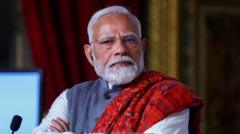As Indian Prime Minister Narendra Modi arrives in Washington for a crucial meeting with President Donald Trump, their longstanding personal rapport will be on display, yet pressing matters loom large. Since their initial meeting in 2017, Modi and Trump have cultivated a connection bolstered by shared motivations, especially in countering China's influence, which has fostered a stronger U.S.-India alliance.
While both leaders are likely to engage in friendly banter and mutual admiration, the underlying transactional aspects of their relationship are expected to take center stage. With the bilateral trade deficit exceeding $46 billion in recent years, Trump may press Modi for additional tariff reductions. In response, Modi could propose bilateral discussions aimed at forming an economic partnership to lower tariffs for both nations.
Ahead of the talks, Delhi has indicated a willingness to lower tariffs and repatriate undocumented immigrants, signaling an effort to mitigate Trump's potential demands. Yet, the issue of undocumented Indian nationals in the U.S., estimated at over 700,000, presents a complex challenge for Modi, particularly in light of recent reports concerning the treatment of deportees.
Additionally, discussions will likely revolve around energy partnerships, with Trump anticipated to request greater Indian purchases of American oil. Notably, India's energy strategy has shifted in recent months towards cheaper imports from Russia due to the evolving geopolitical landscape. Modi's potential request for U.S. investment in India's nuclear energy sector could strike a balance between seeking cleaner energy sources and appealing to American investors.
The technology sector is poised for attention as well, following the establishment of the Initiative on Critical and Emerging Technologies (iCET) during the Biden era. Modi may seek commitments from Trump to sustain this momentum, reinforcing India's role in global tech supply chains amid both nations’ efforts to stand firm against Chinese dominance.
The talks may also delve into broader international concerns, including U.S. policies toward Iran, particularly in relation to developing the Chabahar port, which is vital for India’s connectivity to Central Asia. Modi will likely seek clarity on the implications of U.S. sanctions in this context.
Moreover, Prime Minister Modi may engage Trump on pressing foreign policy issues such as the ongoing conflicts in Ukraine and Gaza, looking for avenues of diplomatic involvement that reflect India's interests and longstanding ties with Russia and Israel.
Despite the weight of these discussions, both leaders are expected to emphasize a constructive tone, with dialogues surrounding the Indo-Pacific Quad partnership—a coalition aimed at countering Chinese influence—standing out as a promising area of cooperation.
India is set to host this year's Quad meeting, offering an opportunity for Trump to strengthen ties and promote a multifaceted relationship that transcends purely transactional concerns. Their meeting in Washington not only symbolizes the ongoing partnership but may also lay the groundwork for future collaborations addressing regional and global challenges.




















